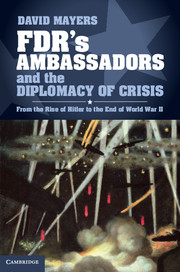3 - New Roman Empire
from Part I - Axis
Published online by Cambridge University Press: 05 December 2012
Summary
Italy in the 1930s–1940s did not strike most Americans as a formidable military power or one capable of overturning the international order. This ambition, were it achievable, might be realized by a German–Japanese combination, but that Italy could contribute to a drastic revision seemed improbable.
Movie audiences in 1940 laughed at the inanities of Benzini Napolini (Il Dig-a-Ditchy), Adenoid Hynkel's pal in Charlie Chaplin's lampoon of Hitler: The Great Dictator. Italy remained the butt of humor, even after the July 1943 ousting of Mussolini and subsequent cooperation with Allied forces. The country's military deficiencies were targets of jest, raising the snide question of whether Italy helped or hindered its putative partners. The popular writer and comics illustrator, Bill Maudlin, reported in his Up Front this exchange between a GI and German soldier fighting near Venafro.
The American had a machine-gun position on top of a hill, and the kraut was a sniper, about fifty yards down the slope. They were well protected, and had been in those positions for many days. Both had cooties, both had trench foot, and each had an intense dislike for the other.
An Italian division was supposed to move into the line near by. The Nazis, having had experience with the Italians when they were fighting on the German side, liked this new idea very much. The Americans, who had seen the Italians as German allies, were not cheered by the prospect.
“How do you like your new ally?” yelled the German to the American . . .
“You kin have ’em back,” said our guy, having come from a region where diplomacy bows to honesty.
“We don't want them,” shouted Jerry, and he lobbed a grenade up the hill. It fell short . . .
“Horse's ass!” snorted the [GI].
- Type
- Chapter
- Information
- FDR's Ambassadors and the Diplomacy of CrisisFrom the Rise of Hitler to the End of World War II, pp. 67 - 92Publisher: Cambridge University PressPrint publication year: 2012



